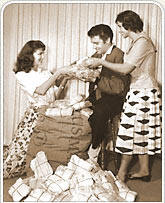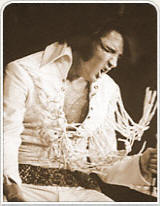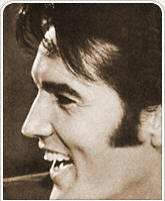
Overview of Achievements / Record Sales
| Index
It is estimated that Elvis
Presley has sold over one billion record units worldwide, more
than anyone in record industry history. In America alone, Elvis
has had 150 different albums and singles that have been
certified gold, platinum or multi-platinum by the Recording
Industry Association of America (RIAA), with more certifications
expected as research into his past record sales continues and as
current sales go on. Research is also underway to document his
record sales achievements in other countries. It is estimated
that 40% of Elvis' total record sales have been outside the
United States. International AcclaimElvis Presley’s trophy room at
Graceland is filled with gold and platinum records and awards of
all kinds from around the world. Some of the countries
represented are: Norway, Yugoslavia, Japan, Australia, South
Africa, England, Sweden, Germany, France, Canada, Belgium, and
the Netherlands.  Fanmail It is interesting to note that, except for a handful of movie
soundtrack songs, Elvis did not record in other languages, and,
except for five shows in three Canadian cities in 1957, he did
not perform in concert outside the United States. Still, his
recordings and films enjoyed, and continue to enjoy, popularity
all over the globe, and he is known throughout the world by his
first name.
Record Chart StatisticsElvis has had no less than 149
songs to appear on Billboard’s Hot 100 Pop Chart in America. Of
these, 114 were in the top forty, 40 were in the top ten, and 18
went to number one. His number one singles spent a total of 80
weeks at number one. He has also had over 90 charted albums with
ten of them reaching number one. These figures are only for the
pop charts, and only in America. He was also a leading artist in
the American country, R&B, and gospel fields, and his chart
success in other countries was substantial. Historic Television Guest AppearancesIn 1956, Elvis made his network
television debut with the first of his six appearances on Stage
Show, a weekly variety program hosted by Tommy and Jimmy Dorsey.
He followed these with two appearances on The Milton Berle Show,
the second of which included a performance of Hound Dog that was
so provocative (for that time, anyway) that it caused a national
scandal. Elvis next appeared on The Steve Allen Show, with Allen
mocking the sensation of the Berle appearance by having Elvis
dress in a tuxedo, eliminate his usual physical gyrations, and
sing Hound Dog to a Basset Hound. Ed Sullivan had once said he
would never have the controversial singer on his top-rated show,
but that was before the week that Elvis’ appearance on Steve
Allen had surpassed Sullivan’s ratings. Sullivan paid Elvis
$50,000 to make three appearances on his show, which was, at the
time, more money than any performer had ever been paid to appear
on a network variety program. When Elvis made his third Sullivan
appearance in January of 1957, Ed Sullivan surprised Elvis by
telling him on camera that his show had never had a better
experience with a name act, and said “I wanted to say to Elvis
and the country that this is a real decent, fine boy.” It was on
this very same Sullivan appearance that Elvis was shown on
camera from the waist up only, one of early television history’s
most memorable moments. Elvis’ next network television
appearance was in 1960, when Frank Sinatra gave his variety show
a “Welcome Home, Elvis” theme to herald Elvis’ return from the
army. Elvis was paid $125,000 to appear - again, making history. The Silver ScreenElvis starred in 31 feature
films as an actor and two theatrically released concert
documentary films, all of which enjoyed financial success. For a
number of years he was one of Hollywood’s top box office draws
and one of its highest-paid actors. His two most critically
acclaimed films, Jailhouse Rock (1957) and King Creole (1958)
have become classics of their era. His movies and concert films
enjoy a healthy life today in television syndication and home
video sales and rentals. Some of his top-selling music came from
his movies. Eleven of his movie soundtrack albums went to the
top ten, and of those, four went to number one. The soundtrack
for G.I. Blues (1960), was number one on the Billboard Top 100
album chart for 10 weeks and remained on the chart for 111
weeks. The album from Blue Hawaii was number one for 20 weeks
and was on the chart for 79 weeks. Television SpecialsElvis Presley’s three network television specials - Elvis (1968) , Elvis: Aloha from Hawaii, via Satellite (1973), and Elvis in Concert (1977) - stand among the most highly rated specials of their time. His 1968 special, Elvis , is one of the most critically acclaimed music specials of all time. His 1973 special, Elvis - Aloha from Hawaii, via Satellite , was seen in 40 countries by 1 billion to 1.5 billion people and made television history. It was seen on television in more American homes than man’s first walk on the moon.  Elvis 1977 The Concert StageWhen Elvis returned to the live
stage after the success of his 1968 television special and the
wrap-up of his Hollywood movie contract obligations, he opened
at the International Hotel in Las Vegas in the summer of 1969
for a 4-week, 57-show engagement that broke all existing Las
Vegas attendance records. He returned to the International a few
months later in early 1970, during the slow winter season in
Vegas, and broke his own attendance record. Right after that
came a record-breaking six-show engagement at the Astrodome in
Houston, where Elvis played to a total of 207,494 people. Elvis
took his elaborate live show on the road in the latter part of
1970 for his first concert tour since 1957. Throughout the
1970’s Elvis toured America, breaking box office records right
and left, and continued to play an engagement or two per year in
Las Vegas and Lake Tahoe. Among the outstanding highlights of
this period was in 1972, when Elvis performed four sold-out
shows at Madison Square Garden. During his “concert years” from
1969 to 1977, Elvis gave nearly 1,100 concert performances. Grammy AwardsElvis received 14 Grammy
nominations from the National Academy of Recording Arts and
Sciences (NARAS). His three wins were for gospel recordings -
the album How Great Thou Art (1967), the album He Touched Me
(1972) and his live Memphis concert recording of the song How
Great Thou Art (1974). In 1971, NARAS also recognized him with
their Lifetime Achievement Award (known then as the Bing Crosby
Award ...in honor of its first recipient). Elvis was 36 years
old at the time. Five of Elvis' recordings have been inducted
into the NARAS Hall of Fame - his original 1956 recordings of
Hound Dog (inducted 1988) and Heartbreak Hotel (inducted 1995),
his original 1954 recording of That's All Right (inducted 1998),
his original 1969 recording of Suspicious Minds (inducted 1999),
and his original 1956 recording of Don't Be Cruel (inducted
2002). The Hall of Fame recognizes "early recordings of lasting,
qualitative or historical significance," with many inductees
being recordings that were created and released before the 1958
inception of NARAS and the Grammy Awards. One of the Ten Outstanding Young Men of the NationThe United States Junior Chamber
of Commerce (the Jaycees) named Elvis One of the Ten Outstanding
Young Men of the Nation for 1970 in a ceremony on January 16,
1971, one of Elvis’ proudest moments. This award has been given
since 1938 and has honored men of achievement in all areas of
endeavor - sports, government, science, medicine, entertainment,
etc. It recognizes outstanding personal achievement and the
exemplification of the opportunities available in the free
enterprise system, along with patriotism, humanitarianism, and
community service. (In the 1980's, eligibility was opened to
women as well as men, and the award has since been presented to
the year's Ten Outstanding Young Americans.) Charitable EndeavorsElvis Presley was famous for
giving away Cadillacs, cash and jewelry, often on the spur of
the moment. But, the true depth and breadth of his generosity
and community involvement is not so widely known. In 1961, Elvis gave a benefit
concert at Bloch Arena in Hawaii that raised over $65,000 toward
the building of the U.S.S. Arizona Memorial at Pearl Harbor. The
resulting publicity gave new life to the fund-raising effort,
which had, by then, lost its momentum. The memorial opened a
year later. Audience tickets for his 1973 Aloha from Hawaii television special and its pre-broadcast rehearsal show carried no price, as each audience member was asked to pay whatever he or she could. The performances and concert merchandise sales were a benefit raising $75,000 for the Kui Lee Cancer Fund in Hawaii.  Elvis
Each year, for many years, Elvis gave $1,000 or more to each of
fifty Memphis-area charities, but also continually made many
other charitable donations in Memphis and around the country. Most of Elvis’ philanthropic
endeavors received no publicity at all. Throughout his adult
life, for friends, for family, and for total strangers, he
quietly paid hospital bills, bought homes, supported families,
paid off debts, and much more. Elvis' legacy of generosity
continues through the work of the Elvis Presley Charitable
Foundation, which is the philanthropic branch of Elvis Presley
Enterprises, Inc. and the creator of the Elvis Presley Endowed
Scholarship Fund at the University of Memphis. The tradition of
giving also continues through the work of the Elvis fan clubs
worldwide, most of which are heavily involved in charitable
endeavors in Elvis' memory. Graceland MansionGraceland, Elvis Presley’s home
and refuge for twenty years, is one of the most visited homes in
America today, now attracting over 600,000 visitors annually. It
is also the most famous home in America after the White House.
In 1991, Graceland Mansion was placed on the National Register
of Historic Places. In 2020, Graceland was designated a National
Historic Landmark. The Elvis StampIn 1992, the U.S. Postal Service
announced that Elvis’ image would be used for a commemorative
postage stamp. The Postal Service narrowed the artwork choices
down to two images - one of Elvis in the 1950’s as a sizzling
young rocker, and one of him as a still-svelte concert superstar
in his 1973 Aloha from Hawaii special. In an unprecedented move,
the USPS put the decision to the American people and distributed
ballots coast to coast. Over 1.2 million votes were cast, and
the image of the young rocker won. The stamp was released on
January 8, 1993, with extravagant first day of issue ceremonies
at Graceland. The Elvis stamp is the most widely publicized
stamp issue in the history of the U.S. Postal Service, and it is
the top selling commemorative postage stamp of all time. The
USPS printed 500 million of them, three times the usual print
run for a commemorative stamp. Several countries outside the USA
also have issued Elvis stamps over the years. Special Posthumous HonorsThe 1984 W.C. Handy Award from
the Blues Foundation in Memphis recognized Elvis for "keeping
the blues alive in his music - rock and roll." The Academy of
Country Music's first Golden Hat Award presented in 1984
recognized Elvis' influence on country music. In 1986, Elvis was
among the first group of inductees into the Rock and Roll Hall
of Fame. In 1987, Elvis was honored with the first posthumous
presentation of the Award of Merit by the American Music Awards,
1987. In 1998, Elvis received the Country Music Association's
highest honor, induction into the Country Music Hall of Fame. In
2001, Elvis was inducted into the Gospel Music Association's
Gospel Music Hall of Fame. With that honor, Elvis is the only
person, so far, to become a member of all three of these halls
of fame - Rock and Roll, Country and Gospel. Generations of FansCurrently, there are more than 625
active Elvis fan clubs worldwide. Elvis' popularity is at an
all-time high, and his legacy continues to reach new audiences.
Half of Graceland's visitor ship is age 35 and under. A New Concert CareerOn August 16, 1997, Elvis, via
video, starred in an extravagant concert production entitled
Elvis in Concert '97 at the Mid-South Coliseum in Memphis,
Tennessee, accompanied live on stage by over thirty of his
former bandmates and the Memphis Symphony Orchestra. The show
played before a capacity crowd of fans who had come to Memphis
from around the world to commemorate the twentieth anniversary
of Elvis' death. Elvis broke the Mid-South Coliseum's all-time
record dollar figure for box office sales. This concert was the
prototype for the 1998/99 touring production Elvis - The
Concert. By being the first performer ever to headline a live
concert tour while no longer living, Elvis made history again.
The March 1998 tour included a three-show smash engagement at
Radio City Music Hall in New York. The August 1998 tour included
the excitement of Elvis' "return" to the Las Vegas Hilton with
an eight-show engagement. The January/ February 1999 European
tour opened with a sell-out at London's Wembley Arena and, in
effect, marked Elvis' first-ever concerts outside of North
America. The show continues to tour periodically. |
||
|
Top of Page |Copyright | © 2021 Elvis Presley Enterprises, Inc. ALL RIGHTS RESERVED. | Legal Notices / Privacy |
||
